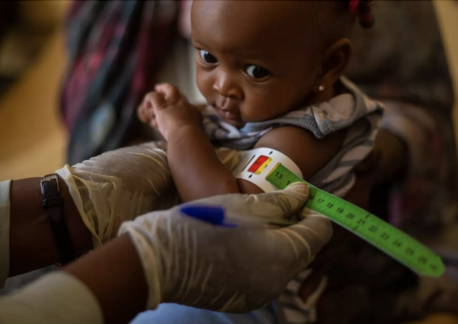
Acutely Malnourished Children in Sudan Need Urgent Support
UNICEF is working with partners in Sudan to curb child malnutrition through mass screenings, immediate referrals and treatment, but more help is needed.
Find, test, treat: UNICEF's approach in action
Sudan is grappling with one of the worst malnutrition crises in the world.
Close to 4 million children are acutely malnourished. An estimated 730,000 are suffering from severe acute malnutrition, or wasting, which is life-threatening if left untreated.
The already dire situation is exacerbated by an ongoing war that continues to push more children into malnutrition every passing day.
With millions of families on the move already struggling to feed their children — and thousands of children trapped in conflict areas with little or nothing to eat — it is feared that many more will be affected now that the country has entered its lean season (April to September).
With Gezira and other breadbasket areas under attack, children are paying the highest price. The health system is also on the brink of collapse, interrupting the delivery of health and nutrition services.
In March, with donor support, UNICEF launched integrated child survival campaigns in Kassala and River Nile states to urgently deliver critical nutrition, health and hygiene services to as many children as possible, focusing on those under age 5.
UNICEF-trained health workers are on the ground delivering a range of services as part of these campaigns. They are conducting mass nutrition screenings for children using color-coded mid-upper arm circumference (MUAC) measuring tapes.
When the measurement falls in the red or yellow zone, the child is immediately referred to the nearest health facility for treatment.

Alongside these screenings and referrals, health workers are also providing vitamin A supplements, deworming, iron folate supplements for pregnant women and guidance on optimal infant and young child feeding practices for pregnant women and mothers of children under 2. They are also distributing soap to promote better hygiene practices during feeding, an important practice that helps reduce the risk of diarrheal disease.
Integrated campaigns such as these are how UNICEF and partners bring critical health care and other services closer to people, saving children's lives and helping them to thrive.
Delivering lifesaving services, one child at a time
The Al-Arab neighborhood, located on the outskirts of Atbara town in Sudan's River Nile state, is a non-Arabic community. Predominantly nomadic, these families are often on the move in search of water and pasture for their animals, which greatly affects their access to health care.
After Malaz, a member of this community, heard about UNICEF's campaign to find, test and treat malnourished children, she sought care for her 2-year-old daughter, Aida, who was unwell.
“My daughter was weak and in need of help,” Malaz said. “She had pain in her head and an infection.”
When it is Aida’s turn to be screened, she is too weak and can hardly sit on her own. Malaz supports her while the health workers wrapped the MUAC tape around her little arm. Her measurement falls in the red zone, indicating that she is severely malnourished and needs immediate medical attention.
One by one, more children are screened; the majority are found to be severely malnourished.
Malaz and other mothers with malnourished children are immediately referred to the Al-Arab health facility for enrollment in the outpatient nutrition program. Here they will receive nutrition care and treatment for their children including Ready-to-Use Therapeutic Food (RUTF), a nutrient-rich peanut paste provided by UNICEF.

Like most of the other children, Aida likes the RUTF, which makes Malaz happy and hopeful after seeing her child eat. As Aida begins her road to recovery, Malaz is optimistic that her child will soon recover now that she has received treatment.
Malaz is given a supply of RUTF sachets to take home and give to Aida in the coming days as advised by the health workers. Their next appointment is in two weeks to assess Aida's progress.
With support from the governments of the United States and the United Kingdom, along with the European Union and the UN's Central Emergency Response Fund, UNICEF has procured and delivered RUTF to lower-level facilities to support the treatment of millions of children suffering from malnutrition like Aida.
This story was adapted from the original published by unicef.org
More funding is needed to scale up UNICEF's emergency response to Sudan's malnutrition crisis. Flexible funding support is the best way to ensure that UNICEF can continue delivering lifesaving protection and support to children and families suffering the impacts of conflict and related crises. Your contribution can make a difference. Donate today.


